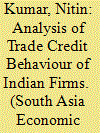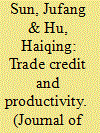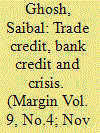| Srl | Item |
| 1 |
ID:
178436


|
|
|
|
|
| Summary/Abstract |
Trade credit transactions are quite common for businesses. The article carries out the trade credit analysis for an emerging economy, namely Indian corporate sector employing rich information dataset covering multiple industries such as manufacturing, services, construction and others, since the period of financial crisis including both firm specific and macro-economic factors. The annual dataset spans 13 years from 2006 to 2018 covering the crisis period. Applying dynamic panel framework, it is found that the inventory management and macro indicators are significant in determining trade credit for Indian firms. While trade payable is chiefly driven by raw material inventory, firms having reasonable stock of raw or finished goods inventory are less likely to offer trade credit. Large-sized firms are found to be both leading consumers and suppliers of the trade credit. The pecking order theory is clearly validated with net profits being preferred over the trade credit that is a more expensive source of finance. Credit from formal financial sources is found to act as a substitute to trade credit borrowing.
|
|
|
|
|
|
|
|
|
|
|
|
|
|
|
|
| 2 |
ID:
143371


|
|
|
|
|
| Summary/Abstract |
Using data for trade credit practices, this work investigates interfirm trust formation by ethnic minority firms in the Xinjiang Uygur Autonomous Region, China. The main findings of this research are as follows. First, there is a general ethnic bias against ethnic minority firms in receiving trade credit. Second, ethnic minority firms are less eager than Han firms to build interfirm trust with their business partners by offering trade credit, which is partly due to their financing constraints. Third, ethnic minority firms have less trust of other ethnic minority firms in offering trade credit. Fourth, these trade credit practices by ethnic minority firms tend to be more pronounced in those surviving after 2005. Fifth, ethnic minority firms do not share their members' information regarding productivity within their circle of ethnic minority firms. Overall, interfirm trust is insufficiently formed, even among ethnic minority firms.
|
|
|
|
|
|
|
|
|
|
|
|
|
|
|
|
| 3 |
ID:
125017


|
|
|
|
|
| Publication |
2013.
|
| Summary/Abstract |
Using 2004-2009 firm-level microdata for enterprises in China's ethnic areas, we investigate whether trade credit really works as an alternative external financing source. We find statistical evidence that trade credit is positively correlated with enterprise productivity; the result continues to hold when taking into account the intermediate role of the working capital turnover ratio. Moreover, our results confirm the positive impact of bank financing on enterprise productivity. All these findings are particularly tenable for Han enterprises.
|
|
|
|
|
|
|
|
|
|
|
|
|
|
|
|
| 4 |
ID:
142015


|
|
|
|
|
| Summary/Abstract |
Employing data on an extended sample of manufacturing firms during 1993–2012, the article studies the inter-linkage between trade credit and bank credit and how it evolved during the crisis. Accordingly, we first discuss the relevance of a trade-credit channel in India and subsequently, explore the interplay between these two financing forms. The analysis provides some evidence in favour of a trade-credit channel in India. More importantly, the findings indicate that bank credit and trade credit are complementary, although there was a differential impact on accounts payable (demand) and accounts receivables (supply) during the crisis.
|
|
|
|
|
|
|
|
|
|
|
|
|
|
|
|